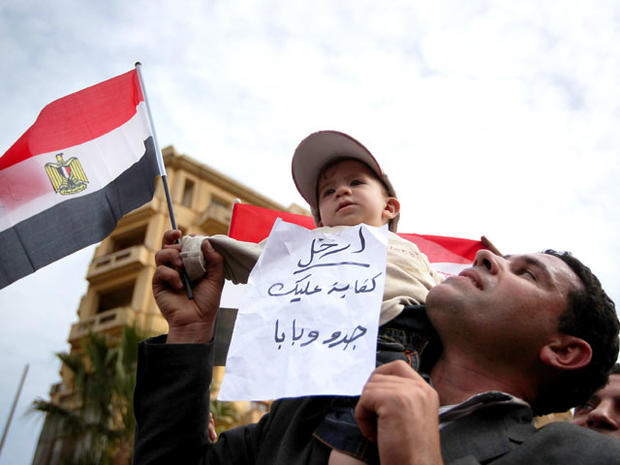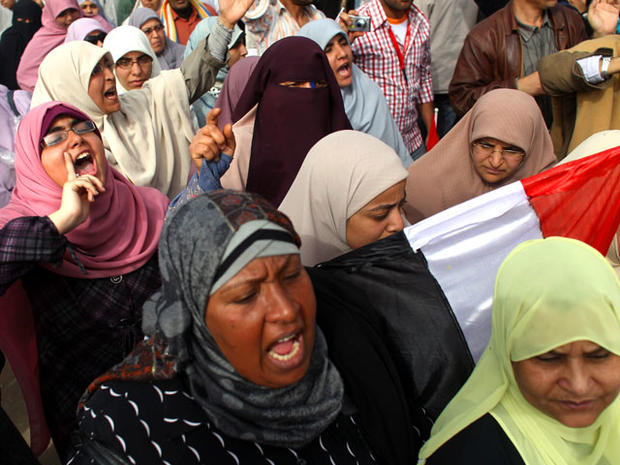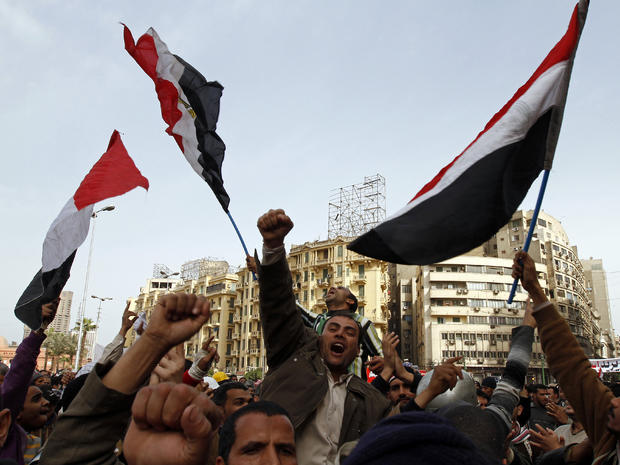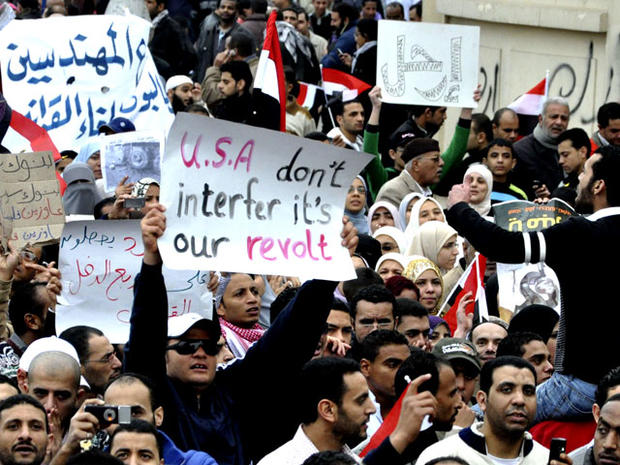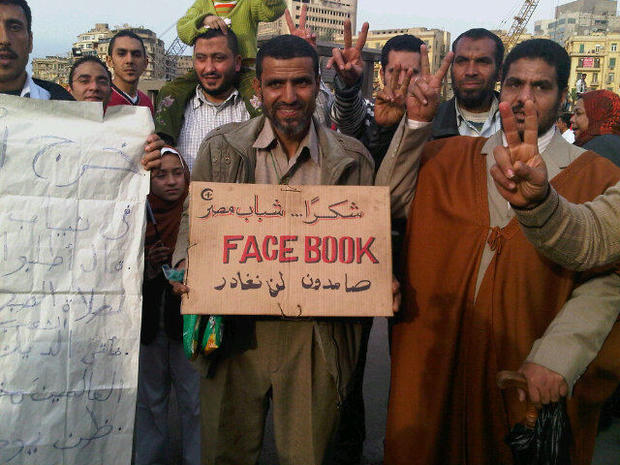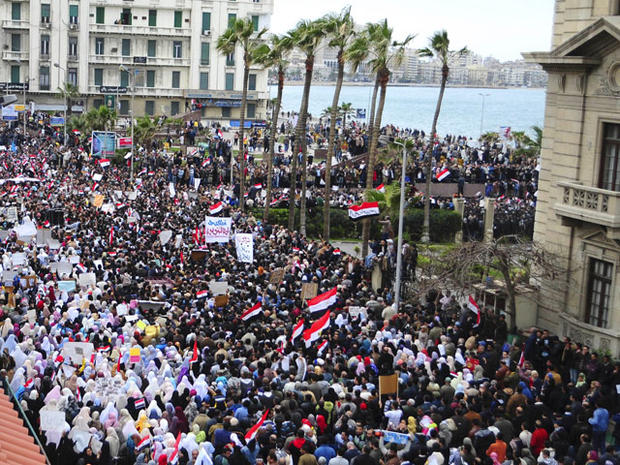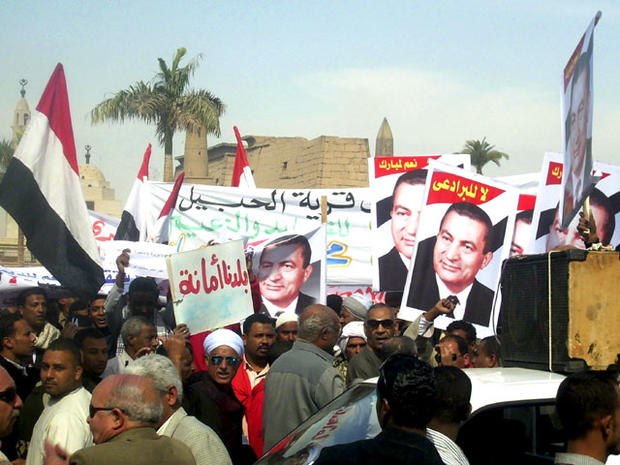Live Blog: Egypt in Crisis, Day 11
For the 11th straight day, protesters are swarming the streets of Cairo demanding President Hosni Mubarak step down and end his 30-year rule. Our blog covers the latest news out of Egypt. (NOTE: Egypt is seven hours ahead of the time posted, which is Eastern U.S. time.)
Day 10 Coverage of Egypt in Crisis
Complete Coverage: Anger in the Arab World
10:38 p.m. ET: Egyptian and American officials tell the New York Times that Egyptian officials are looking for a way to limit President Mubarak's decision-making power and possibly remove him from the presidential palace, but not immediately strip him of the presidency.
9:33 p.m. ET: New York Times reports Obama is criticizing American spy agencies over their performance in predicting and gauging the spreading unrest in the Middle East.
9:13 p.m. ET: Samir Radwan, Egyptian Finance Minister, told CNN banks will be open Sun. in Egypt.
"We expect a rush on banks as soon as they open on Sunday," Radwan told CNN. "We made sure ATM machines have cash....both Egyptian pounds and foreign exchange."
8:56 p.m. ET: Egypt's opposition leader Mohamed ElBaradei tells CNN's Eliot Spitzer on Parker Spitzer that he is willing to run.
"I would like to see this country moving forward into a democracy based
on social justice. If I can do that, and I think weâ??re almost ninety
percent there, then this is my dream come true; however, if people want
me to run afterwards, I will not let them down. I will continue to do
what any person will do for his own country," ElBaradei told Spitzer.
8:45 p.m. ET: Sources tell Fox News Vice President Omar Suleiman was target of assassination attempt that killed two bodyguards soon after he was appointed on Jan. 29. The story is still unconfirmed in Cairo.
8:09 p.m. ET: CBS News' Katie Couric looks back on the last 11 days and how they changed Egypt's history.
8:07 p.m. ET: CBS News' Mark Strassmann reports on Friday, opposition group Muslim Brotherhood's leaders said they won't run a candidate for president, but the
brotherhood does expect to play a role in Egypt's future.
7:03 p.m. ET: Reuters reports that an Egyptian journalist wounded in the protests has died of his injuries. The first journalist known to have died during the unrest, Ahmed Mohammed Mahmoud worked with state-owned daily al-Ahram.
5:03 p.m. ET: The Atlantic's Daily Dish reports that writer and analyst on Middle East affairs Issandr El Amrani doesn't buy the ABC News estimate that President Mubarak is worth approximately $40 to $70 billion.
"Egypt's GDP in 2009 was around $180bn. The Mubaraks are not worth a third of Egypt's GDP, OK?" writes El Amrani in The Arabist.
4:33 p.m. ET: Time for a little levity. Here's a video from FunnyorDie.com of Mubarak saying he's sorry via Chicago's "It's Hard to Say I'm Sorry":
4:27 p.m. ET: PBS has gone through and compiled the 76 State Department cables sent from the U.S. Embassy in Cairo that have been released by WikiLeaks since November. The dispatches date from 2005 until 2010. PBS claims they offer a pragmatic portrait of President Mubarak, the Egyptian government and the politics in the Arab world. In the cables, diplomatic figures alternately trash the growing corruption of those around Mubarak, and praise the Egyptian president for helping broker peace throughout the Middle East.
4:18 p.m. ET: Here is the (as yet unauthenticated) video from an Egyptian vlogger that was said to have helped spark the Egypt demonstrations on January 25:
4:04 p.m. ET: Video of President Obama talking about Egypt, "the entire world is watching":
3:47 p.m. ET: Rosemary Hollis from London's City University tells the BBC: "Any government, irrespective of its political colour, is going to have a huge task to create the numbers of jobs for a million Egyptians coming on the job market every year. You have disaffected graduates who can't find jobs, who are amongst those demonstrating in Tahrir Square. So the glory of the revolution and the toppling of Mubarak is going to be the high point."
3:39 p.m. ET: President Barack Obama spoke today about the crisis in Egypt. Here is some of his statement:
In recent days we've seen violence and harassment erupt on the streets of Egypt that violates human rights, universal values, and international norms. So we are sending a strong and unequivocal message, attacks on reporters are unacceptable. Attacks on human rights activists are unacceptable. Attacks on peaceful protesters are unacceptable. The Egyptian government has a responsibility to protect the rights of its people. The future of Egypt will be determined by its people. It's also clear that there needs to be a transition process that begins now. That transition must initiate a process that respects the universal rights the Egyptian people and that leads to free and fair elections.
We want to see this moment of turmoil turn into a moment of opportunity. The entire world is watching. What we will hope for and work for is a future where all of Egyptian society seizes that opportunity. Right now a great and ancient civilization is going through a time of tumult and transformation. Even as there are grave challenges and great uncertainty, I am confident that the Egyptian people can shape the future that they deserve.
3:33 p.m. ET: Take a look at the CBS News report on the Egypt Crisis, By the Numbers. A sampling:
7,000 - The approximate number of years there has been organized human civilization in the area currently contained by the country of Egypt.
30 - The number of years Hosni Mubarak has been president of Egypt. He assumed the presidency in 1981 after President Anwar El Sadat was assassinated.
7 - The number of months Mubarak has said he will remain in power before bowing out of planned presidential elections in September.
0 - The number of months protesters have said they are willing to wait for Mubarak to step down.
3:17 p.m. ET:More than 160,000 foreigners living in Egypt have left the country since the start of mass protests demanding President Hosni Mubarak's ouster, reports the Los Angeles Times.
An American blogger named "Simply LeAnne" based in Cairo said it has been incredibly hard for non-embassy personnel to get out. Besides the difficulty of getting around the country and communications, the U.S. Government was reportedly charging as much as $10,000 to its citizens to evacuate them, despite the danger.
3:11 p.m. ET: Der Spiegel, a German news magazine, is reporting that yesterday's wild and violent clashes between anti-government protesters and Mubarak's supporters were initiated by for-hire thugs on the Mubarak side. In a report, Der Spiegel writes:
"In exchange for the equivalent of a few euros, poor seasonal workers have taken part in street fighting in Cairo on the side of Egyptian President Hosni Mubarak. The thugs, who fight with iron bars, knives and clubs, have been recruited by privileged members of the regime, including party officials, security forces and rich business people with lucrative state contracts. In Cairo's working-class district, they organized a big demonstration, including a motorcade of cars and motorbikes. They shouted slogans such as "Mubarak, we kneel before you," and "Yes to the president of peace." Taking part were members of trade unions and associations, as well as employees of state-run companies, who were obviously told by their bosses to attend. In the background, the movement is being controlled by businessmen with lucrative state contracts, public servants, security officers and party officials, all of whom are worried by the uncertainty of recent days."
2:18 p.m. ET: At a press briefing, White House spokesman Robert Gibbs said their message to Egypt's government is continued restraint. Gibbs said: "I talked to president this morning. We continue to receive very disturbing reports about very systematic targeting of international journalists." The White House has dealt with the U.S. Embassy in Cairo to help get journalists out of country. Gibbs added: "If journalists are being held, they must be released immediately. The world watches actions. We are heartened that what many thought would come to pass has not happened."
2:07 p.m. ET: Fawaz Gerges, a professor of Middle Eastern Politics and International Relations at the London School of Economics and Political Science, writes in today's Independent of London:
"The regime's base is extremely shallow in comparison to the opposition, which represents an overwhelming majority of the population. The regime has alienated most of the rising social and political classes: centrists and democrats, leftists, nationalists, independent Islamists, and the Muslim Brotherhood. They're left with about 10 per cent of the country, the uppermost echelon of the population. It's a strategic alliance between the business class and the ruling elite, with the support of the state security apparatus, which numbers about a million people. Mubarak's allies hold the top cabinet positions, and his new Vice-President is a very close supporter. But outside that structure there is really no support at all."
2:00 p.m. ET: The coalition of youth movements that sparked that mass protests against President Hosni Mubarak have agreed to form a 25-person committee to represent them in negotiations with the government, reports Ahram Online, a Cairo-based daily. The report is based on an interview with lawyer Ziad El-Eleimy, a leading member of one of the youth movements and a close associate of Mohamed El-Baradei. It goes on to state:
"The 25-person committee is to include an assemblage of Egyptian luminaries, among them El-Baradei himself and another Egyptian Nobel laureate, Ahmed Zewail, a professor of chemistry and physics at the famed California Institute of Technology (Caltec), who also sits on US President Barak Obama's Council of Advisors on Science and Technology. Arab League Secretary General Amr Moussa, who retains wide popularity among Egyptian and Arab publics is also expected to be a member of the committee. The committee (will also) include five representatives of the youth movements."
1:27 p.m. ET: Egyptian Prime Minister Ahmed Shafiq said today in an interview with Al-Arabiya network that he doubts the proposal from the so-called "Wisemen Committee" that has been representing the opposition in negotiations to have Mubarak hand power to Vice President Omar Suleiman as part of a transitional government would be accepted.
Shafiq also claimed that a majority of Egyptians do no want Mubarak to go.
1:20 p.m. ET: The battle between anti-government protesters and Mubarak supporters has moved online as well. Wired.com has this report:
"Ever since Mubarak restored Internet service on Wednesday, the most important dissident Facebook page has seen a curious flood of pro-regime Wall posts, sowing disinformation. Some of the new up-with-Mubarak commentary at We Are All Khalid Said is classic concern-trolling: people wringing their hands over how Egypt's dictator deserves better than calls for his downfall. Some is pure abuse, questioning the loyalties of the page's administrator. And some are blatant attempts to disrupt the protests by claiming upcoming rallies have been canceled. It's hard not to see the trolling as part of a larger effort by Mubarak's allies to win the propaganda battle surrounding Egypt's unrest. They're detaining and beating foreign journalists in order to control the information flow. On Thursday, it arrested online activists."
12:56 p.m. ET: Noted libertarian political activist Noam Chomsky writes about Egypt in the Guardian:
"A common refrain among pundits is that fear of radical Islam requires (reluctant) opposition to democracy on pragmatic grounds. While not without some merit, the formulation is misleading. The general threat has always been independence. The US and its allies have regularly supported radical Islamists, sometimes to prevent the threat of secular nationalism. A familiar example is Saudi Arabia, the ideological centre of radical Islam (and of Islamic terror). Another in a long list is Zia ul-Haq, the most brutal of Pakistan's dictators and President Reagan's favorite, who carried out a programme of radical Islamisation (with Saudi funding)."
12:45 p.m. ET: The U.K. government filed a formal complaint with the Egyptian government after U.K. company Vodafone revealed it was forced to send pro-Mubarak propaganda messages to its entire list of service subscribers, reports Bloomberg News.
British Foreign Secretary William Hague yesterday issued a statement calling the "abuse" of Internet and mobile-phone networks "unacceptable and disturbing." The offending Feb. 1 text message sent forcibly via Vodafone read: "The Armed Forces urge Egypt's loyal men to confront the traitors and the criminals and to protect our families, our honor and our precious Egypt."
12:43 p.m. ET: President Hosni Mubarak's family has a net worth that ranges between $40 billion and $70 billion, reports ABC News. Experts say the wealth of the Mubarak family was built largely from military contracts during his days as an air force officer. He eventually diversified his investments through his family when he became president in 1981.
12:40 p.m. ET: CBS Radio's Vicki Barker discuess in this Washington Unplugged video the tough choices journalists are making in the wake of attacks against them, i.e. reporting on a breaking story or staying out of harm's way:
12:37 p.m. ET: A CBS News spokesperson confirmed that CBS News Chief Foreign Correspondent Lara Logan, cameraman Don Lee and producer Max McClellan were released after being held by the Egyptian military in Cairo on Thursday, and that they are en route back to the United States.
12:20 p.m. ET: Mohamed ElBaradei, Egyptian opposition figurehead, told an Austrian newspaper today that he won't run in presidential elections in September.
12:00 p.m. ET: BBC's security correspondent Frank Gardner: "For the protesters, today has been a bit of a disappointment. Not the numbers, but that President Mubarak shows no sign of departing. And the secretary general of his party says there is no way he is going to go until he can arrange an orderly transition."
11:48 a.m. ET: The chairman of the Joint Chiefs of Staff said Friday the U.S. hasn't raised its military readiness or alert status because of the instability in Egypt, even though the Obama administration is very concerned about the instability there. Adm. Mike Mullen also said there shouldn't be any rush to terminate military assistance to President Hosni Mubarak's government.
11:44 a.m. ET: Egypt's economy has lost at least $3.1 billion as a result of the political crisis in the country, investment bank Credit Agricole said in a report released on Friday.
The unrest that began on Jan. 25 led to the shuttering of businesses and companies, the closure of banks and the stock exchange and the exodus of thousands of tourists as the demonstrations. The ensuing violence almost overnight drove a nation once seen as a pillar of stability to the brink of chaos.
Credit Agricole, in one of the first assessments quantifying the damage to the economy, said the crisis is costing Egypt at least $310 million per day. The bank also revised down its forecast for 2011 GDP growth to 3.7 percent from 5.3 percent and said the Egyptian pound could see a depreciation of up to 20 percent.
11:38 a.m. ET: CBS News correspondent Elizabeth Palmer reports on the party atmosphere in Tahrir Square in Cairo today, a far cry from the violence of the last several days:
11:32 a.m. ET: Cutest protest video ever? This is unconfirmed footage of a little boy leading a crowd of anti-Mubarak demonstrators:
11:25 a.m. ET: Al-Masry Al-Youm is also reporting that Egyptian security forces have broken into the Muslim Brotherhood's online headquarters, seized equipment and arrested 12 journalists and technicians.
11:11 a.m. ET: The independent Egyptian daily Al-Masry Al-Youm released this report on protesters' injuries:
"Nearly 5000 protesters have been injured in clashes during the demonstrations that kicked off on 25 January, Egypt's new Health Minister Ahmed Farid said on Friday. The majority of injuries were caused by blows from stones and other objects, while the number of people injured by gunfire was comparatively low, Farid said in statements quoted by official media outlets. Farid said the clashes between Mubarak's opponents and supporters between Wednesday night and Thursday morning yielded eight deaths and 915 injuries. according to the latest count on Thursday night."
10:56 a.m. ET: The editor-in-chief of the Dubai-based Gulf News, Abdul Hamid Ahmad, asks a question on his Twitter feed that many in the Arabian peninsula are beginning to ask: "Why there is no Arabic mediation in the Egyptian crisis but only American? Is Egypt more imprtant for the American(s) than the Arabs?"
10:49 a.m. ET: NBC's Richard Engel posted this picture on his Twitter feed:
10:34 a.m. ET: Attacks against and arrests of journalists appear to have slowed down but not stopped on Friday. Besides the ransacking of Al Jazeera's office, Sonia Verma of Canada's Globe and Mail reported being attacked by pro-Mubarak demonstrators. The Canadian reporters were only saved when a group of strangers surrounded her team and fired into the air. Verma also wrote this disturbing tweet: "The police acknowledged to me the pro-mubarak mob gets paid."
10:27 a.m. ET: Al Jazeera has released this video of protesters in Cairo during Friday prayers demanding regime change, prisoner release and constitutional change:
10:24 a.m. ET: Cuba's Fidel Castro writes on his blog:
"Mubarak's fate is sealed, not even the support of the United States will be able to save his government. The people of Egypt are an intelligent people with a glorious history who left their mark on civilization. "From the top of these pyramids, 40 centuries of history are looking down upon us," Bonaparte once said in a moment of exaltation when the revolution brought him to this extraordinary crossroads of civilizations."
10:20 a.m. ET: Iran's leaders have been portraying the Egypt uprising as a replay of the 1979 Iranian Islamic Revolution.
In a speech, Iran's Supreme Leader accused Mubarak of
doing America's bidding, particularly in the Israeli-Palestinian
conflict.
Supreme Leader Ali Khamenei said during Friday prayers that Egyptian President Hosni Mubarak betrayed his people and the uprising against his rule is the appropriate response. Khamenei told worshippers that widening unrest in the Arab world is a sign of an "Islamic awakening" that was sparked by the 1979 Iranian revolution. In his speech, Khamenei accused Mubarak of turning Egypt (a close U.S. ally) of doing America's bidding, particularly in the Israeli-Palestinian conflict. Egypt was the first Arab country to sign a peace agreement with Israel, and Mubarak has been a key mediator between Israel and the Palestinians.
"America's control over Egypt's leaders has ... turned Egypt into the biggest enemy of Palestine and turned it into the greatest refuge for Zionists," Khamenei said.
ALEXANDRIA - Thousands gather and many more march towards the area to join them, chanting "People want the system to fall" and "We won't leave, he will leave."
SUEZ - A few thousand gather in the port city after Friday prayers.
ISMAILIA - Thousands of anti-government protesters congregate in main street. Around 100 pro-Mubarak protesters rallied earlier in the day, they were separated from the main gathering by the army and later left.
PORT SAID - A few thousand anti-government protests take to the streets, a few hundred pro-Mubarak demonstrators tried to infiltrate the crowd but were stopped by the army and the two sides were separated.
MANSOURA - Thousands protesting against Mubarak and his administration in the Nile Delta city, a member of the April 6 opposition movement said.
DAMANHOUR - Around 5,000 protesting in the Nile Delta town.
QALYUBIYA - About 1,000 anti-government protesters and 100 Mubarak backers on the streets in the Nile Delta city.
EL ARISH - A few thousand were protesting against the government in the Sinai city. There was no sign of pro-Mubarak protesters.
ASWAN - Some 2,000 are protesting against Mubarak in the southern city. A few hundred pro-Mubarak demonstrators tried to mix with the crowd but citizens managed to stand in the middle to form a human barrier to keep the two sides separate.
10:07 a.m. ET: The Wall Street Journal's Jay Solomon reports:
The so-called resistance bloc of nations and Islamist movements, led by Iran and Syria, believes it is increasingly on the ascent as unrest seethes in the Middle East. United in its opposition to the U.S. and Israel, this coalition is seeing many of its chief regional adversaries weakened--particularly Egyptian President Hosni Mubarak and Jordan's King Abdullah II. Regional analysts say the wave of political upheaval in the Mideast could still target the Iranian and Syrian governments themselves, which are among the world's most repressive. But they also acknowledge the attacks on America's key Arab allies are opening political space for the self-proclaimed resistance bloc to expand its influence.
9:49 a.m. ET: GlobalPost columnist Michael Moran writes that there are essentially four ways forward for Egypt now.
The most likely has Mubarak handing power, slowly or in a de facto manner forced by his opponents, to a transitional figure who attempts to calm dissent and pledges to reform Egypt, all while protecting the old regime and retaining the main elements of Egyptian foreign policy. This route, however, has a high risk of rejection by an impassioned protest movement. Mubarak could also still opt to pursue a pervasive crackdown, with brutal consequences in terms of human lives and Egypt's reputation. Already, there are signs of orchestrated provocations typical of regimes in their dying days on the streets of Cairo. A third, less violent (at least initially) option would involve a complete capitulation to a secular opposition figure like Mohamed ElBaradei, a bitter pill for Egyptian elites but perhaps one that allows them to negotiate an amnesty for their own abuses. Finally, while unlikely to unfold quickly, the risk exists that (as in Iran in 1979) the broad-based uprising might be coopted by a highly organized minority with militant leanings -- in Egypt's case, the Muslim Brotherhood. Egyptian society, secular and sophisticated in its urban manifestations, would resist this, perhaps violently.
9:36 a.m. ET: The Guardian has produced this video of British Prime Minister David Cameron warning the Egyptian president against the 'hiring of thugs' to attack protesters:
9:30 a.m. ET: Tens of thousands of anti-Mubarak protesters also took to the streets in Egypt's second largest city, Alexandria, reports Agence France Presse. A majority appear to be from the Muslim Brotherhood, whose main base is there. A security source told AFP that tens of thousands of demonstrators were on the streets in cities across Egypt.
The demonstrations, however, are taking their toll outside Cairo. The Global Post's Heather Murdock writes from Alexandria:
"Prices of everything from bread to transportation have skyrocketed, salaries have not been paid and people are exhausted from policing their own streets night after night. In the past five days, the cost of making a phone call has nearly doubled. Bread is 10 times what it cost last week."
9:17 a.m. ET: Pro-Mubarak demonstrators have begun chanting "Where is Al Jazeera? The Egyptian people are here," according to Al Jazeera producer Evan Hill, on the ground in Cairo.
Earlier, Al Jazeera reported that its Cairo office had been ransacked by a "gangs of thugs." The office has been burned along with the equipment inside it. In a statement on its website, Al-Jazeera said:
"It appears to be the latest attempt by the Egyptian regime or its supporters to hinder Al Jazeera's coverage of events in the country. In the last week its bureau was forcibly closed, all its journalists had press credentials revoked, and nine journalists were detained at various stages. Al Jazeera has also faced unprecedented levels of interference in its broadcast signal as well as persistent and repeated attempts to bring down its websites."9:14 a.m. ET: Iran's Supreme Leader Ali Khamenei said Friday the U.S. faces "irreparable defeat" if Middle East uprisings are successful.
8:56 a.m. ET: On a broadcast of Al-Masriya this morning focusing on "foreign intervention in Egypt's affairs," many pro-Mubarak supporters called in condemning Western leaders for calling on President Mubarak to step down and immediately implement a transition to a replacement government, with warnings that such action could plunge the country into chaos and allow Islamists to take control.
The anchor compared the protests involving millions of Egyptians with the recent shooting of Rep. Gabrielle Giffords in Arizona, saying a similar situation has replicated itself in the United States, "but we didn't see Mubarak calling on Obama to step down."
8:44 a.m. ET: Amnesty International reports that two of its staffers were arrested Thursday in Cairo. Also arrested at the same time was a Human Rights Watch staffer named Daniel Williams. Their whereabouts are still unknown.
They were working at the Hisham Mubarak Law Centre (HMLC), when those offices were raided by the military police, said AI. HMLC has been helping to provide legal help to protesters camped out in Cairo's Tahrir Square.
"It is hard to describe the feeling of utter helplessness of being so geographically close but not knowing where they are or who is holding them," said a statement on AI's website.
8:34 a.m. ET: Reporting from Cairo, CBS News correspondent Elizabeth Palmer reports on the real shift of mood in Tahrir Square compared to yesterday's clashes, with the army seemingly having thrown its support behind the anti-Mubarak demonstration.
Soldiers have set up barricades with concertina wire to keep pro-Mubarak and anti-Mubarak protesters separate.
The Internet is back online, Palmer says, so even though Cairo is peaceful at the moment, some of the images of the violence are just now circulating online.
Among the most disturbing is video of what appears to be a police van careening through a crowd, running over countless people. The video, allegedly recorded on Jan. 28, has not been confirmed. (Click on video player below.)8:15 a.m. ET: Speaking at Friday prayers in Tehran, Iran's Supreme Leader Ayatollah Ali Khamenei said that the uprising of the Egyptian people against the rule of President Hosni Mubarak was "a failure" for U.S. policies.
Khamenei also said that Mubarak betrayed his people and the uprising is the appropriate response.
As reported by Iranian state media Press TV, Ayatollah Ali Khamenei also told worshippers that widening unrest in the Arab world is a sign of "Islamic awareness" in the region.
8:10 a.m. ET: Al Jazeera's English-language channel reports that a few hundred pro-Mubarak supporters have gathered on the 6th of October Bridge, and that an Army tank has moved to try to block them from entering Tahrir Square, and keep them separate from anti-government supporters.
7:56 a.m.: The Associated Press' Kimberly Dozier reports that U.S. intelligence agencies are drawing criticism from the Oval Office and Capitol Hill that they failed to warn of revolts in Egypt and the downfall of an American ally in Tunisia.
President Barack Obama has told National Intelligence Director James Clapper that he was "disappointed with the intelligence community" over its failure to predict the outbreak of demonstrations would lead to the ouster of President Zine el-Abidine Ben Ali in Tunis, according to one U.S. official familiar with the exchanges, which were expressed to Clapper through White House staff.
The official, who spoke on condition of anonymity to discuss matters of intelligence, said there was little warning before Egypt's riots as well.
Yesterday, however, Reuters reported that President Barack Obama was warned about instability in Egypt at the end of 2010. "We have warned of instability. We didn't know what the triggering mechanism would be for that. And that happened at the end of the last year," said Stephanie O'Sullivan, a current CIA official nominated to become the principal deputy director of national intelligence.
7:06 a.m. ET: Witnesses tell Al-Jazeera that mobs and secret police have begun trying to block anti-government protesters reaching Tahrir Square. The witnesses say soldiers at the scene are telling the would-be protesters to return home. If the reports are accurate, it would represent the first reported confrontation between the two sides on Friday.7:06 a.m. ET: Al Arabiya television reports that Arab League Secretary-General Amr Moussa - an Egyptian national who has suggested he may run in a national election - has joined the crowd in Tahrir Square.
7:02 a.m. ET: Italian Prime Minister Silvio Berlusconi, an aging world leader with plenty of his own problems to worry about, came out Friday strongly in defense of Egypt's embattled president. "I hope that in Egypt there can be a transition toward a more democratic system without a break from President Mubarak, who in the West, above all in the United States, is considered the wisest of men and a precise reference point," Berlusconi told reporters in Rome, according to the Reuters news agency. Berlusoni has dismissed an investigation into his relationship with a young belly dancer as politically contrived hearsay. 6:30 a.m. ET: Thousands of anti-government supporters have flooded into Cairo's central Tahrir Square again today, hoping to deliver long-time President Hosni Mubarak his marching orders on what protest organizers dubbed the "Friday of Departure". In an apparent show of the government's resolve, however, the nation's top military commander, Defense Minister Hussein Tantawi, showed up in Tahrir Square with other senior officers to inspect the troops. Tantawi, whose force has benefited for decades from enormous U.S. cash handouts, has been a key member of Mubarak's regime, and his presence in the square was likely a clear message: we're still in charge.